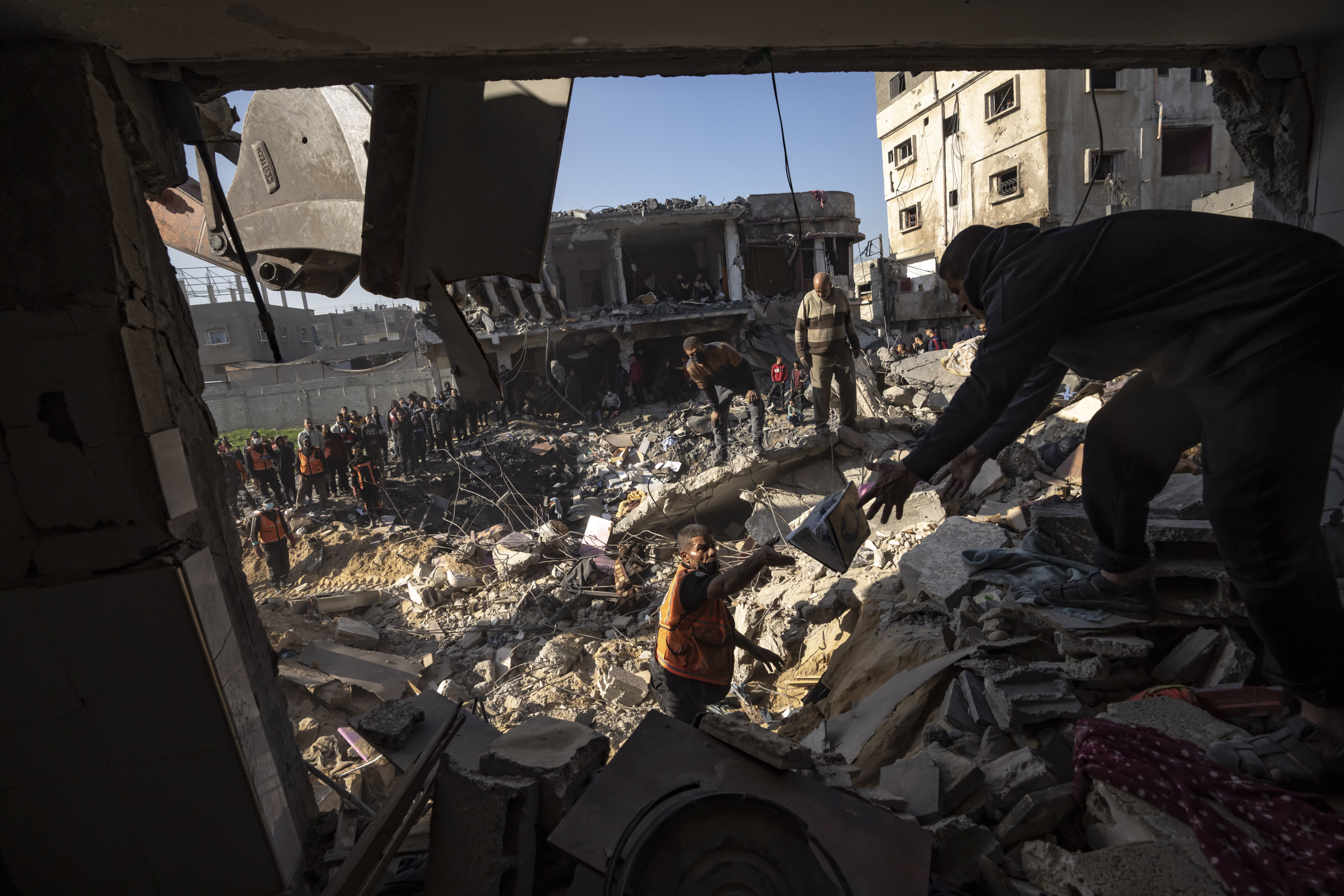Why a potential Israel-Hamas cease-fire has so many names
It’s not always clear what measures lawmakers are advocating for. That may be the point.


Politicians around the world are calling for Israel to curtail its intensive military operation in the Gaza Strip. But they’re using different — and often confusingly vague — phrasing to push for peace.
Sustainable cease-fire. Mutual and permanent end to the violence. Immediate de-escalation and cease-fire. Mutually agreed-upon bilateral humanitarian pause.
One of the most popular is “bilateral cease-fire,” which has been adopted by dozens of U.S. Democratic lawmakers, including Rep. Katie Porter (Calif.). In a statement Monday night, Porter used the term when calling for the release of all hostages seized in the Oct. 7 Hamas attack on Israel, the end of Hamas control of Gaza and “security for Israel.”
But it’s not always clear exactly what those proposing Israel pull back its operations are advocating for. That may be the point. Vague terms make it possible for politicians to accomplish two tasks: advocate for some semblance of peace in the Middle East without completely alienating the United States’ closest ally in the region.
And those involved in the congressional debate on the lighting rod issue say Democrats are trying to balance the variety of constituencies with clashing views on how to handle Israel’s war with Hamas — trying to keep the party as aligned as possible.
Democrats have, for example, managed to gather 14 backers in the Senate for the idea of conditioning aid to Israel — along with assistance for Ukraine and Taiwan. But even getting to that rhetorical agreement has been a push, according to those who support it.
“Right now, I think we do better with my colleagues when we keep it one step at a time,” said Sen. Elizabeth Warren (D-Mass.).
Sen. Chris Van Hollen has called for a “humanitarian pause” until President Joe Biden can get a clear commitment from Israeli Prime Minister Benjamin Netanyahu about how he’ll conduct the war with far fewer civilian casualties, and cooperate on humanitarian assistance for Gazans. Van Hollen acknowledged the political discourse has sometimes lacked clarity.
“I think there's been some confusion, so all I can do is state my position without trying to define other people’s terms,” he said in an interview. “I’m trying to be precise.”
Calls for some sort of break in fighting have increased as the toll of Israel’s operation on Palestinian civilians has become apparent. Israel’s military has leveled huge swaths of Gaza with widespread airstrikes and its ground operation, killing nearly 20,000 Palestinians in just over two months, according to Gazan health officials.
But the cease-fire phrases — some without clear definitions, others seemingly plucked from thin air — run the risk of confusing the general public even more. These calls are complicated by the fact that there’s no internationally agreed-upon definition for a cease-fire.
“These are not terms of art with fixed, well-defined meanings, so the devil is really in the details,” said Brian Finucane, a former State Department lawyer.
Some of the politicians’ calls have been fleshed out with details about how to end the violence in the region for the long term. Others omit key details.
In a joint statement earlier this month, some of the lawmakers calling for a “bilateral ceasefire” attempted to clarify the “bilateral” part: “Both sides must come to the table in agreement; only then can we lay the groundwork to create a true two-state solution.”
On a similar note, Rep. Diana DeGette (D-Colo.) said the U.S. should pressure Israel and Hamas to negotiate a “mutual and permanent end to the violence,” which would include an end to all fighting, a release of hostages and deliveries of humanitarian aid into Gaza.
Rep. Jamie Raskin (D-Md.) also suggested a mutually agreed-upon bilateral humanitarian pause, which calls for a pause in fighting and an influx of humanitarian aid to Gaza, but not an end to hostilities for the long term.
British Foreign Secretary David Cameron and German Foreign Minister Annalena Baerbock called for a “sustainable cease-fire” on Saturday, advocating for a long-term end to fighting between Israel and Hamas.
“Our goal cannot simply be an end to fighting today. It must be peace lasting for days, years, generations,” the ministers wrote.
In their article, however, they blame Hamas for the violence but call on Israel to “discriminate sufficiently between terrorists and civilians.”
What’s clear so far is the debate and outside pressure campaign hasn’t fundamentally altered the state of play in the U.S. Senate, where all but a handful of Democrats have yet to sign onto the concept of a cease-fire — however it’s defined.
“The notion of a cease-fire against Hamas — a group that just pledged to destroy Israel — is kind of just hard to wrap my head around,” said Sen. Tim Kaine (D-Va.) in an interview. “Obviously, it takes two.”
Sen. Sheldon Whitehouse (D-R.I.) said of the calls for a cease-fire that it’s “hard to tell signal from noise” but that “Hamas got a cease-fire and then went out and murdered three Israelis and then shot 16 others,” referring to Israel accusing Hamas of breaking the first truce in early December.”
In the House, 17 progressive lawmakers have signed onto a resolution urging Biden to immediately “call for and to facilitate de-escalation and a cease-fire” between Israel and Hamas. They don't specify whether fighting should stop indefinitely, but they call for humanitarian aid to be sent into Gaza.
At a minimum, the emphasis on a “bilateral” or “mutual” cease-fire means that Hamas has to stop firing rockets if Israel stops airstrikes, said Finucane, who now advises the nonprofit International Crisis Group. The other part of these terms is about timing — if the fighting should stop now or later in the future.
“If you call for a cease-fire only once Israel's military objectives have been achieved in Gaza, even if you assume that is possible, that is not really calling for a cease-fire,” Finucane said.
Nicholas Wu contributed to this report.
A version of this story previously appeared in POLITICO’s National Security Daily newsletter.












